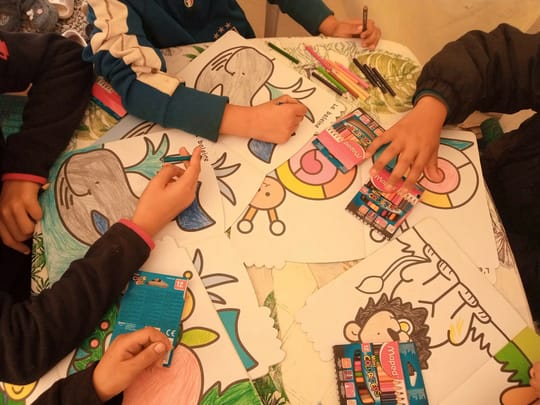Children's Challenges: A Story of Inspiration and Change

In our journey in life, we encounter setbacks and events that leave deep imprints on our soul, and form real psychological scars whose severity and impact vary from one individual to another. Despite their advanced age, there are many people who cannot overcome these difficulties and challenges.
What happens to young children? What happens to them when they face these challenges? How do they deal with them, and what is the touching story of this young child who faced challenges beyond his age?
During the workshops that we conducted within the framework of the project for psychological and social support for earthquake victims and in partnership with the High Atlas Foundation, we visited many villages, and most of my interaction with children was through recreational workshops with the aim of alleviating the burden of what happened. Every child has a different story from another. The hero is an essential thing in a child's story, and every story that does not contain a real hero makes the child feel frustrated, except this time the child who loves puzzles was the hero of the story.
At the beginning of the workshop, I noticed a child who was shy and reluctant to participate with other children, and avoided talking as much as possible, which caught my attention because he was a lonely child who did not participate in talking or playing. I was curious to know why he was isolated, so I approached him with a piece of dough in my hand, which was just an excuse to talk to him and find out the reason for the tension and anxiety that appeared on his face. I said, "Shall we play together? What's your name?"
Some time passed while I was waiting for his answer, until I thought he did not want to talk to me, so I was surprised by his answer, which came out in the form of intermittent letters, and between each letter it took time. Yes, he is a child with stuttering, which is a psychological condition characterized by difficulty forming words smoothly and correctly, and it appears more in cases of pressure or tension, which greatly affects communication and self-confidence in children. He suffers from psychological consequences that may increase and affect his psychological and social development if he does not have a supportive environment that encourages him to express himself freely, in addition to family support in dealing with his psychological challenges and providing him with the necessary love. And support. The family plays an important role in such cases, which made me ask his mother about the reason for his stuttering. Was he born with it?
Strong earthquakes, rockslides, and collapsed buildings affected him terribly, and he lost his ability to express himself, especially since he found himself alone.
Meanwhile, his family was trying to rescue their neighbors and people whose homes had been destroyed in the chaos and destruction. For hours and days, he felt fear, panic, and extreme sadness, still reeling from the shock of the event, as he searched for any trace of the fate of his missing friends. Since then, fear and pain continued to accompany him, until his voice dried up and layers of stuttering affected him without anyone noticing what happened to him because they were all under the influence of shock. In an attempt to help him overcome this situation, I decided to enlist the help of his mother to get to know the child more, and she told me that her son is very smart and loves decoding stories that contain riddles.
Based on this information, I immediately began looking for puzzles of this type that suited his age, intelligence level, and interests in an innovative and entertaining way, which sparked his interest. I tried using puzzles as a way to encourage him to think and solve problems, which is fun and effective exercise for his mind. It also aims to motivate him to express his thoughts and communicate better, which helps him overcome stuttering and strengthen his language skills.
Over time, I noticed a noticeable improvement in his condition as he began to smile and enjoy solving puzzles, and his ability to communicate and interact with others improved. He also became less anxious and fearful and began to respond better to the challenges he faced. This game continued for three days, during which I told them that whoever solved the puzzles would get a game, which kindled the fire of excitement among them. Over time, his interest in participating and solving puzzles increased, which boosted his self-confidence and restored joy in his life. This type of interaction has a major role in motivating the child and enhancing his abilities, which confirms the importance of emotional support and encouragement in overcoming challenges and difficulties.
As soon as the promised day, the fourth day, came, and the gifts were distributed to them, I gave him his gift. He thanked me, saying that it was beautiful and flowing smoothly amidst his smile, so I thanked him. Where did the stuttering go? He simply and confidently replied that it had disappeared, which sparked my surprise and joy at this clear improvement in his condition.
His simple, confident words: “I'm gone.” That moment was not just a passing moment, but rather a turning point in his journey, a remarkable transformation that enhanced hope and joy.
His overcoming the challenge of stuttering reflects the willpower and resilience of young souls and reminds us that we can achieve change with faith and true support. This simple moment reflects the strength of human will and its ability to transform and change, which inspires all of us hope and optimism in our ability to improve our lives and the lives of others. Pain is not always evil as long as it does not control us.